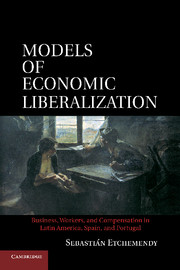 Models of Economic Liberalization
Models of Economic Liberalization Book contents
- Frontmatter
- Contents
- Acknowledgments
- Part I The Intellectual Terrain
- 1 Overview
- 2 From State to Society
- Part II The Political Economy of Business Adjustment
- Part III The Political Economy of Labor Adjustment
- Part IV The Market Model
- Part V Comparative Perspectives in Ibero-America
- 10 Conclusions
- Appendix
- Bibliography
- Index
1 - Overview
Models of Economic Liberalization in ISI Economies
from Part I - The Intellectual Terrain
Published online by Cambridge University Press: 07 October 2011
- Frontmatter
- Contents
- Acknowledgments
- Part I The Intellectual Terrain
- 1 Overview
- 2 From State to Society
- Part II The Political Economy of Business Adjustment
- Part III The Political Economy of Labor Adjustment
- Part IV The Market Model
- Part V Comparative Perspectives in Ibero-America
- 10 Conclusions
- Appendix
- Bibliography
- Index
Summary
Introduction
The crisis of the early 1970s and its aftermath was a watershed for modern capitalism. In advanced countries, it signaled the end of the golden age of postwar development based on Keynesian demand stimulus, low unemployment, and welfare state consolidation. In the less developed Southern Europe and most of Latin America, it began to show the exhaustion of postwar strategies of economic growth predicated on domestic market expansion, state intervention, and high tariff walls, the so-called model of Import Substitution Industrialization (ISI). Indeed, the pace and scope of the market transformations that have developed since then were arguably more dramatic in these semiclosed economies than in most of the advanced countries or the East Asian Newly Industrialized Countries (NICs), which were already more open to international markets and had achieved consistent rates of export-led growth before the phenomenal acceleration of capital mobility and trade started to sweep the world in the early 1980s.
Market-oriented officials in the semiclosed economies of Latin America and Southern Europe, by contrast, were caught between formidable external economic pressures for reform and the hostility of entrenched domestic interests with little to win, and much to lose, from a move toward more open markets. Unlike their counterparts in Eastern Europe, where civil societies were generally weak and organized actors had not been autonomous from the state for decades, market reformers in ISI economies often faced the opposition of powerful unions, industrial associations, or domestic business groups quite independent of state control. Indeed, if democratization was often seen in Eastern Europe as positively associated with economic reform and liberalization (Pop-Eleches : 166; Ekiert : 113; Hellman : 232) and as strengthening pro-market actors (independent firms, parties, or occasionally unions), in the Iberian-American world the reverse was generally true: democratization was accompanied by the activation and empowerment of popular (and often business) groups long opposed to economic liberalization. For these reasons, ISI economies became the center of the debate on the “politics of economic adjustment” two decades ago. In politically unstable contexts, academics and officials in multilateral institutions observed that strong executives and state autonomy from hostile economic interests, such as unions or domestic business groups, were essential for the imposition of economic liberalization.
- Type
- Chapter
- Information
- Models of Economic LiberalizationBusiness, Workers, and Compensation in Latin America, Spain, and Portugal, pp. 3 - 23Publisher: Cambridge University PressPrint publication year: 2011


